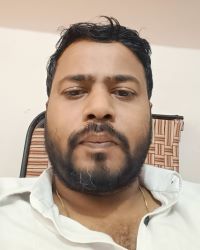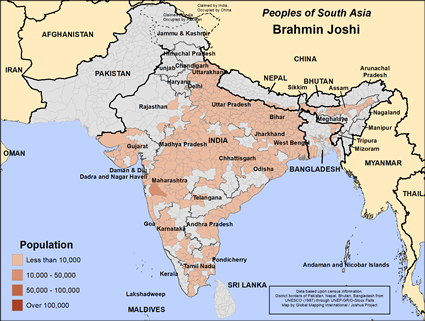Brahmin Joshi in India

Photo Source:
Anonymous
|

Map Source:
People Group data: Omid. Map geography: UNESCO / GMI. Map Design: Joshua Project.
|
| People Name: | Brahmin Joshi |
| Country: | India |
| 10/40 Window: | Yes |
| Population: | 383,000 |
| World Population: | 387,600 |
| Primary Language: | Hindi |
| Primary Religion: | Hinduism |
| Christian Adherents: | 0.00 % |
| Evangelicals: | 0.00 % |
| Scripture: | Complete Bible |
| Ministry Resources: | Yes |
| Jesus Film: | Yes |
| Audio Recordings: | Yes |
| People Cluster: | South Asia Forward Caste - Brahmin |
| Affinity Bloc: | South Asian Peoples |
| Progress Level: |
|
Introduction / History
The Joshi are a Brahmin group who lives in many states of Indian. The name Joshi means astrologer or light bringing in Sanskrit. During colonial times, the Joshi would travel from place to place telling the fortunes of the other castes.
The primary language of the Joshi is Hindi. As educated Indians, they also speak English and other regional languages.Most Joshi Brahmins live in the Indian states of Uttar Pradesh, Bihar, Madhya Pradesh and Maharashtra. Smaller groups live in other areas of India.
What Are Their Lives Like?
Today some Joshi Brahmins still are employed as astrologers. Often before a Hindu wedding, an astrologer is consulted for setting the best date and time. Most Joshi are no longer astrologers but serve in the highest levels of Indian society as politicians, actors, Hindu scholars, lawyers, engineers, computer scientists and writers. The Joshi encourage both their sons and daughters to get graduate degrees.
Brahmins are still deeply influenced by the traditional four stages of life; the first student stage is followed by the householder stage, where marriage, raising a family and being a productive member of society is the primary obligation of an individual. Once children are married there is time for spiritual concerns in the third stage of reclusiveness, which is followed (this is rarely practiced) by itinerant homeless wandering.
The Joshi Brahmins are endogamous, that is they will only marry another Brahmin. Families arrange marriage with the consent of the young persons. Sons and sometimes daughters inherit property. Their dead are buried or cremated. Most Joshi are vegetarians. Some will eat meat but not beef. Their main foods are rice, curries, vegetables fruit and dairy products.
What Are Their Beliefs?
In some cases Brahmin subgroups are defined by their theological distinctions such as Madhva Brahmins, who are defined by their dualist theology, though everyone does not actually hold those beliefs. However, many Brahmin castes are made up of people who adhere to all the various philosophical and theological options espoused by modern Hindus, including hard core secularists and atheists. One can never predict what an individual Joshi Brahmin might believe or disbelieve!
What Are Their Needs?
The Joshi, like other Brahmins groups in India, need to be humbled and begin to see themselves as sinners. Like all other people of India, they need the forgiveness and supernatural peace and hope that only Jesus Christ can give.
Prayer Points
Pray that God opens the spiritual eyes of Joshi Brahmin hearts to the light and power of Jesus Christ.
Pray for Holy Spirit directed Christ followers to go to Joshi Brahmin communities and tell them about Jesus.
Pray for a movement to Christ to emerge in every Joshi Brahmin community.